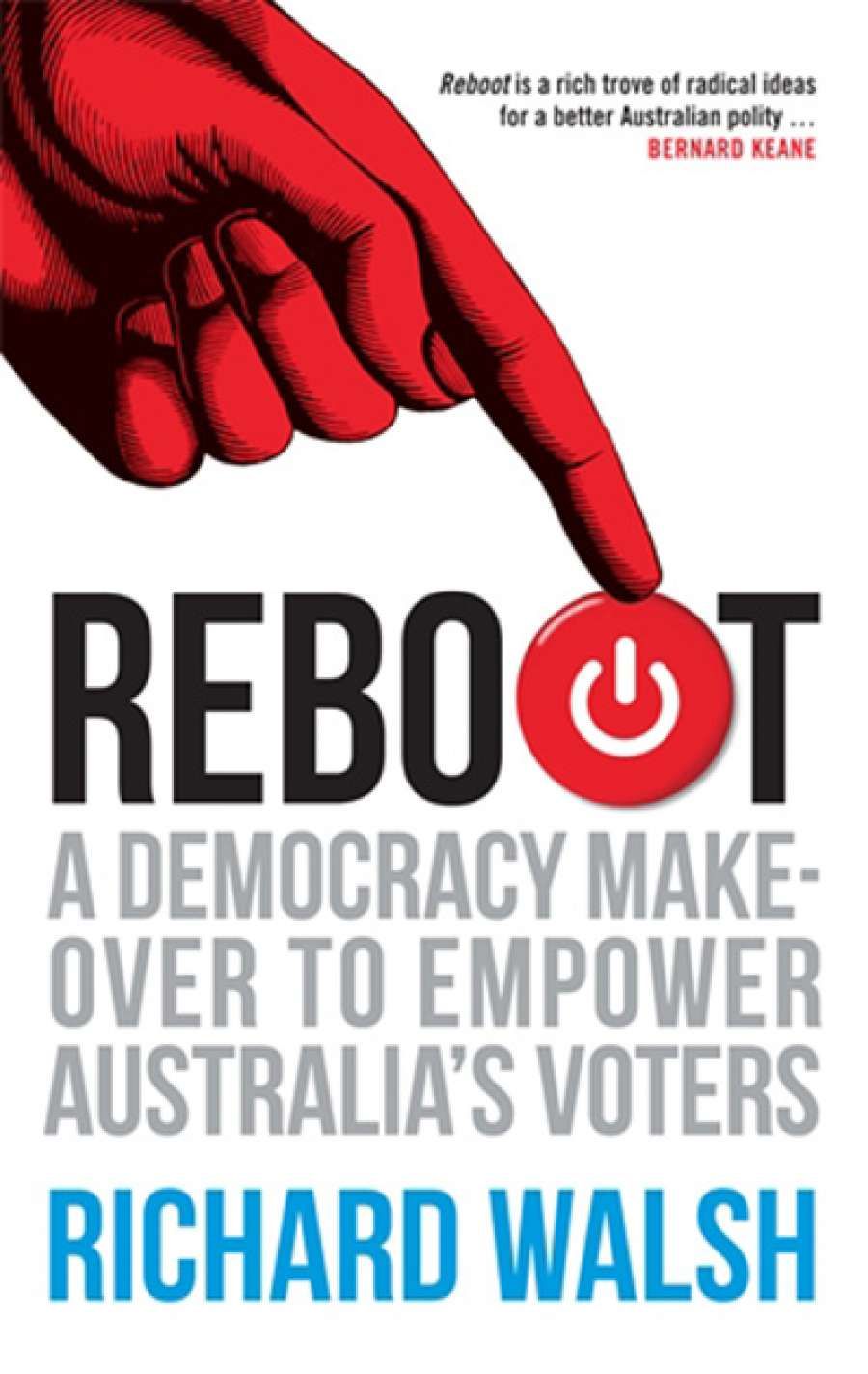
- Free Article: No
- Contents Category: Politics
- Custom Article Title: Shaun Crowe reviews 'Reboot: A democracy makeover to empower Australia’s voters' by Richard Walsh
- Book 1 Title: Reboot
- Book 1 Subtitle: A democracy makeover to empower Australia’s voters
- Book 1 Biblio: Melbourne University Press, $24.99 pb, 128 pp, 9780522872156
After a lifetime of working around politics – as a youthful agitator with Oz magazine, and later journalist, editor, and publisher – Richard Walsh has produced his own remarkably comprehensive solution to this malaise. Reboot: A democracy makeover to empower Australia's voters calls for nothing less than a complete constitutional revolution: with an elected, but mostly ceremonial president, an indirectly elected prime minister whose Cabinet is populated by apolitical experts, and a House of Representatives liberated from party politics.
Like Marx, Walsh argues that tradition, weighing like a nightmare on the brains of the living, is holding the country back (“the structures we have inherited are themselves a product of our cultural and historical traditions; they also, to some extent, legitimise those traditions”). Reboot reimagines Australian politics from the ground up.
Walsh’s proposed system is complicated, sometimes bafflingly so, but its main target is the political party. He seems to genuinely detest the institution. In his depiction, parties are little more than snake-pits. They elect dull hacks for public office, depend on corrupt institutions to survive, and suppress any civic spirit that might otherwise prosper: ‘Only the hyper-ambitious and factional stooges are prepared to give up their valuable time to attend branch meetings. Anyone with half a brain knows that these organisations are breathtakingly undemocratic – the important decisions are top-down, not bottom-up.’
Because of this, the core of Reboot ’s new political model is the ‘uncoupling’ of political representation and advocacy. This means taking ideological activists out of parliament, and replacing them with ‘good and independent people ... not beholden to any political party’. Walsh’s ideal representative is unclouded by ideology or group loyalty, open to the best available argument and evidence.
This alternative universe is founded on its own normative model of political behaviour. While never stating it explicitly, Walsh is inherently suspicious of any collective approach to politics. The idea that people could be united by an ongoing set of interests, ideas, or social preferences – and that a group of voters could feel a lasting affinity with that platform – is perplexing, even sinister to him. He claims that parties could only attach themselves to trade unions or corporate enterprises because of financial dependence, never an alignment of purpose.
 Richard WalshIf there is an analogue in Australian history to Walsh’s analysis, it is the now defunct Australian Democrats. Throughout the party’s history, Democrat politicians claimed to transcend the conflicts shaping political competition; suggesting that demands could be reconciled through a commitment to evidence and expertise. In the same spirit, Reboot believes that parliament should be defined by blank-slate deliberation, rather than social representation. While any call for better faith dialogue is welcome, not all political disputes can be overcome through this kind of discussion. Some issues involve fundamentally conflicting positions, because of either finite resources or different images of the good life and society. The Democrats themselves learned this in the late 1990s, when they split over economic policy and the Goods and Services Tax. We can never fully remove politics from parliament.
Richard WalshIf there is an analogue in Australian history to Walsh’s analysis, it is the now defunct Australian Democrats. Throughout the party’s history, Democrat politicians claimed to transcend the conflicts shaping political competition; suggesting that demands could be reconciled through a commitment to evidence and expertise. In the same spirit, Reboot believes that parliament should be defined by blank-slate deliberation, rather than social representation. While any call for better faith dialogue is welcome, not all political disputes can be overcome through this kind of discussion. Some issues involve fundamentally conflicting positions, because of either finite resources or different images of the good life and society. The Democrats themselves learned this in the late 1990s, when they split over economic policy and the Goods and Services Tax. We can never fully remove politics from parliament.
But while Walsh’s solution might be misguided, he is right that the party system is under great stress. In increasingly complex societies, political preferences are fractured along more than one cleavage. It is possible that, rather than posing a threat to the concept of parties, the growth of smaller groups is simply the system adjusting to the new demands being placed on it. If true, and if parliament is going to function, the old and new parties will need to learn to work together. Voters will also need to react more maturely. This is to say that politics will be different, but not necessarily fatal to parties. My skeptical university students are still invested in politics, and their passions frequently overlap with party policy; their energy can still be harnessed in new ways. Importantly, major organisations seem to be slowly reassessing their relationship with members and activists — understanding them as electoral assets, rather than ideological burdens. If parties wish to prove Walsh wrong, and take themselves off the endangered species list, these new challenges need to be embraced.


Comments powered by CComment